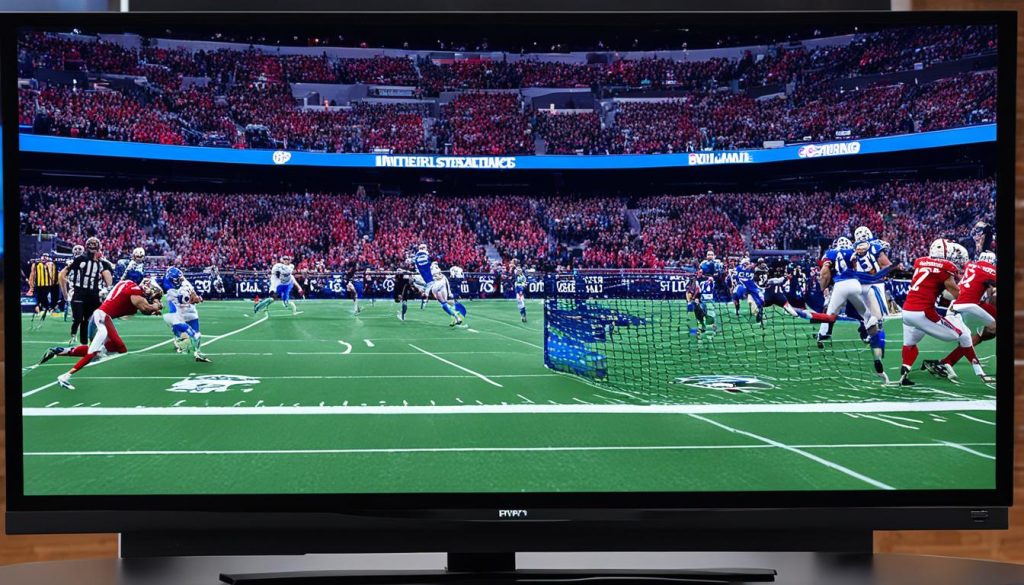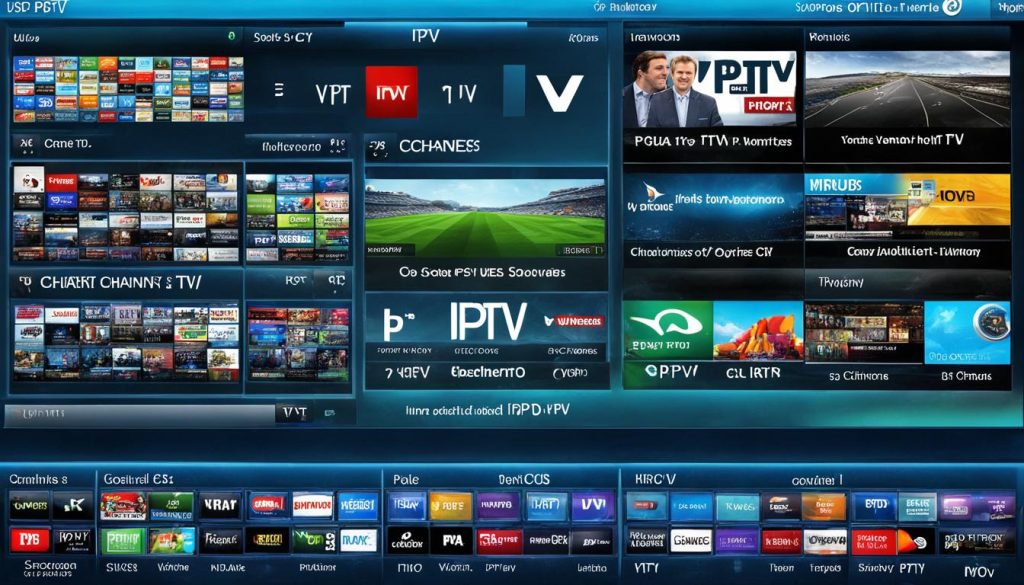Over the past decade, video content has experienced a significant surge, accounting for nearly 82% of global internet traffic in 2021. As online video continues to evolve, some concepts, such as IPTV and over-the-top (OTT) streaming, have caused confusion among viewers. Both IPTV and OTT distribute video content over the internet using the IP protocol, but they differ in the type of service they offer, their infrastructure, and delivery method.
Key Takeaways
- IPTV delivers video content through a private, managed network, ensuring superior quality and security.
- OTT streaming, or Internet TV, uses the public internet to deliver a wider range of on-demand and live content.
- IPTV requires specialised equipment and infrastructure, while OTT can be accessed through various internet-connected devices.
- IPTV generally offers a more reliable and consistent viewing experience, but OTT provides greater flexibility and accessibility.
- The choice between IPTV and OTT depends on factors such as content preferences, budget, and technical requirements.
Understanding IPTV and Internet TV
As the world of digital entertainment continues to evolve, two distinct concepts have emerged: IPTV and Internet TV (also known as over-the-top or OTT). While both deliver video content over the internet, they differ in their underlying infrastructure, delivery methods, and the overall user experience.
What is IPTV?
IPTV, short for “Internet-based protocol television,” is a digital television system that delivers live and on-demand video content over a privately managed network, such as a local area network (LAN), wide area network (WAN), or an internet service provider (ISP) network. IPTV is designed to provide superior video and audio quality, with minimal interruptions, by reserving dedicated bandwidth for video delivery and ensuring enhanced network security.
How does IPTV work?
IPTV utilises a closed, proprietary network infrastructure to distribute video content. This network is typically managed by an ISP or a dedicated IPTV service provider, ensuring a controlled and secure environment for video delivery. IPTV subscribers access the service through a set-top box or a compatible device, which communicates with the IPTV network to receive live TV channels, on-demand content, and other interactive features.
What is Internet TV (OTT)?
Internet TV, also known as over-the-top (OTT) streaming, refers to the delivery of video content over the public internet, typically through internet-connected devices such as smart TVs, smartphones, tablets, or media players. OTT services are not bound to a specific network infrastructure and can be accessed by users directly through internet-enabled devices or applications.
How does Internet TV work?
Internet TV (OTT) services utilise the public internet infrastructure to deliver video content to users. Viewers can access these services through various internet-connected devices, such as smart TVs, smartphones, tablets, or media players, by downloading and using the corresponding applications or accessing the service through a web browser. OTT providers typically offer a wide range of content, including live TV channels, on-demand movies, and TV shows, catering to the diverse preferences of viewers.
Key Differences Between IPTV and Internet TV
When comparing IPTV and Internet TV (OTT), it is essential to understand the primary distinctions between the two technologies. These differences lie in their content delivery, network infrastructure, components needed, video quality, pricing, and types of content offered.
Content Delivery and Network
IPTV delivers content over a private, managed network, ensuring reliable and uninterrupted video streaming. In contrast, Internet TV (OTT) utilises the public internet infrastructure, which can result in occasional buffering or quality fluctuations depending on the user’s internet connection and network congestion.
Components Needed
IPTV typically requires a set-top box or a compatible smart TV, while Internet TV (OTT) can be accessed through a variety of internet-connected devices, such as smartphones, tablets, laptops, and gaming consoles.
Video Quality
IPTV generally offers superior video and audio quality, often with support for advanced codecs like HEVC, which enables the delivery of high-definition (HD) and even ultra-high-definition (UHD) content. Internet TV (OTT) may have variable video quality depending on the user’s internet bandwidth and the service provider’s encoding capabilities.
Pricing
IPTV services are typically bundled with the user’s internet or cable TV subscription, resulting in a more comprehensive package. Internet TV (OTT) services, on the other hand, are often offered as standalone subscriptions, providing more flexibility in terms of pricing and content selection.
Types of Content
IPTV providers typically offer a wider range of live TV channels, as well as on-demand content, while Internet TV (OTT) platforms may have a more diverse selection of on-demand movies, TV shows, and niche or specialised content.

How does IPTV compare to internet TV?
When examining the differences between IPTV and Internet TV (OTT), it is essential to consider the advantages and disadvantages of each option. This comparison can help consumers make an informed decision based on their specific needs and preferences.
IPTV Advantages and Disadvantages
One of the primary advantages of IPTV is its superior video and audio quality, as it utilises a private, managed network to deliver content. This ensures a more reliable and uninterrupted viewing experience, with minimal buffering or latency issues. Additionally, IPTV offers enhanced network security and the ability to prioritise bandwidth for video delivery, resulting in a consistently high-quality service.
However, IPTV also has some disadvantages. It typically requires a set-top box or dedicated equipment, which can be more expensive than the devices needed for Internet TV. Furthermore, the content library available on IPTV platforms may be more limited compared to the vast selection offered by OTT services.
Internet TV Advantages and Disadvantages
The primary advantage of Internet TV (OTT) is its flexibility and accessibility. OTT services can be accessed on a wide range of internet-connected devices, including smartphones, tablets, and smart TVs, allowing users to enjoy content seamlessly across multiple platforms. Additionally, OTT platforms often provide a more extensive content library, with access to a broader range of live and on-demand programming.
However, the performance of Internet TV can be affected by the user’s internet connection and bandwidth availability. Fluctuations in internet speed can lead to buffering, pixelation, or interruptions in the viewing experience. Furthermore, the video quality may not be as consistently high as that of IPTV, depending on the user’s internet service and the specific OTT platform being used.
Choosing the Right Option for Your Needs
When deciding between IPTV and Internet TV (OTT), it is essential to consider factors such as video quality, reliability, content availability, and overall cost. Users who prioritise a consistently high-quality viewing experience and are willing to invest in dedicated equipment may find IPTV to be the more suitable choice. On the other hand, those who value flexibility, accessibility, and a broader content selection may find that Internet TV (OTT) better meets their needs.
Conclusion
In summary, IPTV and Internet TV (OTT) are two distinct methods of delivering video content, each with its own advantages and disadvantages. IPTV offers a reliable, high-quality service through a private network infrastructure, providing users with a seamless viewing experience and enhanced network security. On the other hand, OTT provides a more flexible and cost-effective solution, granting access to a broader range of internet-connected devices and a wider selection of content.
When choosing between IPTV and OTT, the decision should be based on individual preferences, budget, and the specific requirements of the viewer. IPTV may be the preferred choice for those seeking a premium, uninterrupted viewing experience, while OTT may be more suitable for those seeking greater flexibility and a wider content selection at a more affordable price point.
Ultimately, the evolution of video content delivery continues to transform the way we consume media, offering consumers more choices and a more personalised viewing experience. As technology advances, the lines between IPTV and OTT may become increasingly blurred, leading to a convergence of the two platforms and a more seamless integration of the services they provide.
FAQ
What is IPTV?
IPTV, short for “Internet-based protocol television,” is a digital television system that delivers live and on-demand video over a privately managed network, such as a LAN, WAN, or an internet service provider (ISP) network.
How does IPTV work?
IPTV guarantees superior video and audio quality without interruptions, as well as enhanced network security, by reserving bandwidth specifically for video delivery.
What is Internet TV (OTT)?
Internet TV, also known as over-the-top (OTT) streaming, is a method of delivering video content over the internet using the IP protocol. It provides a more flexible and cost-effective solution with access to a wider range of internet-connected devices.
How does Internet TV work?
Internet TV (OTT) delivers video content over the internet, allowing users to access a wide range of live and on-demand programming through various internet-connected devices, such as smart TVs, smartphones, and tablets.
What are the key differences between IPTV and Internet TV (OTT)?
The primary differences between IPTV and Internet TV (OTT) lie in their content delivery, network infrastructure, components needed, video quality, pricing, and types of content offered.
What are the advantages and disadvantages of IPTV?
IPTV offers a reliable, high-quality service through a private network infrastructure, but it may be more expensive and have limited device compatibility compared to Internet TV (OTT).
What are the advantages and disadvantages of Internet TV (OTT)?
Internet TV (OTT) provides a more flexible and cost-effective solution with access to a wider range of internet-connected devices, but it may have lower video quality and less reliable delivery compared to IPTV.
How do I choose the right option for my needs?
When choosing between IPTV and Internet TV (OTT), it’s important to consider factors such as your budget, the type of content you prefer, the devices you use, and the importance of video quality and reliability in your viewing experience.



